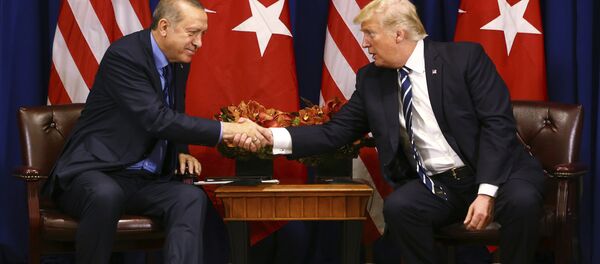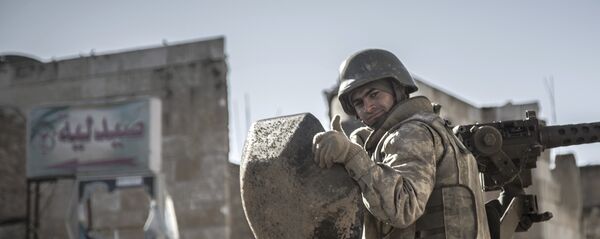No one can guarantee that the Kurdish self-defense units armed with American weapons will not one day get out of US control and threaten the world's balance of power, political scientist Ozdemir Akbal told Sputnik Turkey drawing parallels with the emergence of al-Qaeda in the 1980s.
"Let us not forget that al-Qaeda was ultimately formed as a result of the American support for the Mujahideen in 1979," Akbal said. "In other words, the US position on this issue can create a very serious threat."
The political scientist referred to Trump's earlier statement saying that all US deliveries of weapons to the Kurdish People's Protection Units (YPG) would be curbed. The YPG are considered by Ankara to be affiliated with the Kurdistan Workers' Party (PKK), a designated terrorist group in Turkey.
Akbal remarked that Trump's words were welcomed by Ankara, however, the crux of the matter is that "according to international sources, the US has delivered no less than 2,000 (according to local sources, 4,000) trucks with weapons to the Kurdish self-defense forces… It's heavy weapons, armored vehicles and tanks."
The political scientist underscored that Trump's statement doesn't solve the problem related to the US weapons which were supplied to the Syrian Kurds earlier.
Meanwhile, on November 28, Abdulaziz Yunus, who is in charge of foreign affairs of the SDF revealed to Sputnik that the US and the coalition have never stopped arms supplies, despite earlier reports that Trump promised Erdogan to put an end to deliveries to the Syrian Kurds.
He specified that, only a day before, Washington had sent "hundreds of trucks loaded with weaponry," all of which have been brought from Qamishli, a city in northeastern Syria on the border with Turkey, to the districts of Deir ez-Zor, where the SDF is currently launching a military operation against Daesh.
Akbal believes that if Turkey does not pursue a policy which could prompt concerns in Damascus, Russia can play a substantial role in securing Syria's territorial integrity by limiting Washington's initiatives in the region.
"Today Russia is a global force and a player that is balancing the US," the political scientist said. "If Syria and Turkey establish [direct] contact, Russia will be able to exert some pressure on the Kurdish Democratic Union Party (PYD) thus, weakening and eventually nullifying the US initiative in Syria."
He believes that Turkey, for its part, "must make some efforts to make that possible." For instance, Ankara should refrain from harsh rhetoric towards the Syrian authorities, and from using foreign policy as a tool to influence the [Syrian] domestic affairs, as well as from the demonstration of neo-Ottomanism aspirations.
Akbal warned that otherwise, "the Syrian authorities can start cooperating with other forces, in particular with the PYD, which will kick off a process that is contrary to Turkey's interests."
Meanwhile, speaking to Sputnik, former CIA and US Army intelligence officer Philip Giraldi underscored that the US will retain its military bases and presence in Syria and continue to militarily support Kurdish forces there despite saying it will end its backing for rebel groups.
The CIA veteran highlighted that the US government was determined to maintain a significant military presence in Syria to ensure it had influence on the negotiations that would end the six-year-long civil war.
"Washington will stay so it will have a presence at any negotiations that take place to end the civil war," he said.
The US' growing military presence in Syria is considered by Turkey as one of the biggest threats to the country's territorial integrity and its security.




